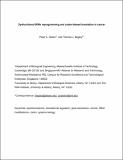Dysfunctional tRNA reprogramming and codon-biased translation in cancer
Author(s)
Dedon, Peter C; Begley, Thomas J
DownloadAccepted version (7.559Mb)
Publisher with Creative Commons License
Publisher with Creative Commons License
Creative Commons Attribution
Additional downloads
Publisher with Creative Commons License
Publisher with Creative Commons License
Creative Commons Attribution
Terms of use
Metadata
Show full item recordAbstract
Many cancers hijack translation to increase the synthesis of tumor-driving proteins, the messenger mRNAs of which have specific codon usage patterns. Termed 'codon-biased translation' and originally identified in stress response regulation, this mechanism is supported by diverse studies demonstrating how the 50 RNA modifications of the epitranscriptome, specific tRNAs, and codon-biased mRNAs are used by oncogenic programs to promote proliferation and chemoresistance. The epitranscriptome writers METTL1-WDR4, Elongator complex protein (ELP)1-6, CTU1-2, and ALKBH8-TRM112 illustrate the principal mechanism of codon-biased translation, with gene amplifications, increased RNA modifications, and enhanced tRNA stability promoting cancer proliferation. Furthermore, systems-level analyses of 34 tRNA writers and 493 tRNA genes highlight the theme of tRNA epitranscriptome dysregulation in many cancers and identify candidate tRNA writers, tRNA modifications, and tRNA molecules as drivers of pathological codon-biased translation.
Date issued
2022Department
Massachusetts Institute of Technology. Department of Biological EngineeringJournal
Trends in Molecular Medicine
Publisher
Elsevier BV
Citation
Dedon, Peter C and Begley, Thomas J. 2022. "Dysfunctional tRNA reprogramming and codon-biased translation in cancer." Trends in Molecular Medicine, 28 (11).
Version: Author's final manuscript